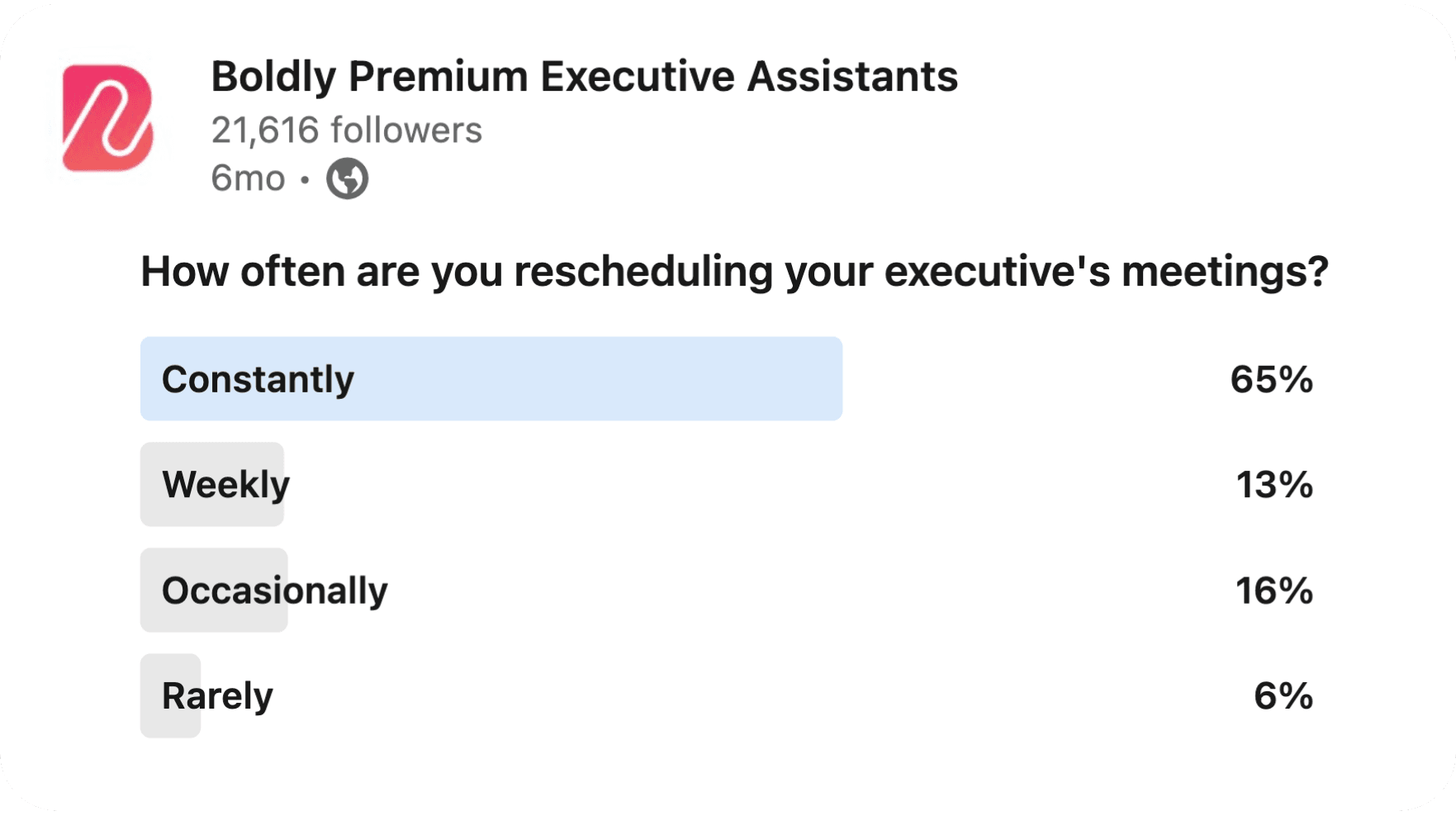For most executives, their schedules are either tightly woven or in a complex tangle.
Virtual meetings haven’t done much to reduce the complexity. In-person travel has been replaced by complicated digital platforms used to request and hold meetings. In some ways, the ease of asking for virtual meetings has increased the requests for an executive’s time.
Suddenly, it became easier to meet more often, for everything, all the time. Sound familiar?
Over 75% of people feel like their meeting schedules are out of control. They rank scheduled meetings as a disruption, right up there with email and office chit-chat, but before social media. You can see there’s a significant problem.
And that’s just meetings. Think of everything else that ends up on your calendar!
It’s a bold statement to make, but without an executive assistant helping you with your complex schedule, there’s no way you’ll pull it off for the long term. Frustration, errors, missed meetings, and a reputation for an impossible schedule are on the horizon.
Clearing your calendar isn’t really an option, but controlling it is.
We’ll show you how, using a virtual assistant for scheduling.
Why Executives Have Complex Schedules
For many executives, their entire day revolves around meetings with multiple parties. Meetings grease the wheels; without them, nothing moves.
Even if that’s not the case for some execs, just about everything must be put on a schedule or it won’t get done. Yes, that means blocking out time on a calendar to respond to emails, travel, attend personal appointments, or meet with investment partners.
Effective calendar management isn’t just about time management; it’s also about controlling access. Time is limited, and an executive can’t say “yes” to everyone.
Let’s put that into perspective.
On average, an executive works about 62 hours a week. Of that time, 75% was scheduled in advance, with only 25% made up on the fly. 72% was spent in meetings, with the rest spent alone doing work or regrouping.
It’s safe to say that most schedules have to do with meetings of all sorts, including cascading meetings which are generated from another meeting.
After a while, it feels like you’re being chased by the schedule.
Growth is wonderful, but it also requires executives to find efficient scheduling solutions. There’s no room for poor time management. Being busy isn’t the same as being productive.
There’s one solution, and it isn’t working harder. It’s getting a skilled remote executive assistant.
How A Remote Executive Assistant Handles A Complex Schedule
On LinkedIn, we recently asked our community of executive assistants how often they were rescheduling their executive’s meetings. Unsurprisingly, the majority answered “Constantly.”


Some busy executives have to have multiple assistants dedicated only to handling their schedule. Trying to do it yourself with an ad hoc solution means you’re already losing ground.
That’s why many leaders are turning to fractional executive assistants.
Your schedule—the key driver of activity for an executive—is the Holy Grail for productivity. It’s easy to understand the need for a high-end executive assistant who does more than simply look at the calendar and drop meetings in.
Bringing on an executive assistant for a few hours a day for time management makes sense. A top-shelf remote executive assistant understands scheduling inside and out.
1. They understand the buffer zone around meetings.
It’s easy to completely pack a calendar, but no human can fulfill that kind of schedule. There need to be buffer zones around meetings for things like travel time or regrouping.
A great remote executive assistant plans some wiggle room into the schedule for meetings or events that might run over. They might even schedule some meetings that have a tendency to run long or get sidetracked with “safeguards” in place, such as planning them over lunch, or just before a natural cut-off time.
We all need breathing room in our schedule; a great remote executive assistant understands that.
They know when to block out time for their executive to work and when to schedule a break. Executives aren’t always aware of overwork taking place, but a great executive assistant can spot it and adjust the schedule accordingly.
2. They understand what their executive prefers.
A good remote executive assistant gets to know their executive.
Each person has their own personality, work style, and daily schedule preferences. A schedule that works for one executive won’t for another.
Some prefer afternoon meetings, while others don’t. Some refuse meetings on Mondays or Fridays, while others are indifferent. Some need mental space between meetings while others like to charge forward and work through a solid chunk of meetings at once.
Not only does a great remote executive assistant understand work preferences, but also personal schedules. Both schedules impact each other. The calendar is filled with more than just business meetings, but also gym time, picking kids up from school, special events, or dinner reservations.
As an executive, you rely on your virtual assistant to know and remember these things. They are the boundaries the work schedule exists in.
3. They understand the executive’s priorities.
You can have a perfect schedule, but not for long.
Something is going to come along that will blow it apart, and a great executive assistant can handle it as long as they understand what takes priority.
They know which items on a schedule are flexible and can be adjusted or moved if something more important pops up. They know which meetings, investors, or clients are VIP and take priority. They know how to filter out requests for access to the executive, and can say “no” so the exec doesn’t have to.
4. They take an active approach to understanding.
Most importantly, a great remote executive assistant takes the time to learn these priorities and preferences with an active approach by scheduling their own time with the executive.
It doesn’t have to be daily or even weekly. It might be once a month for planning and an overview of the upcoming calendar. Effective calendar management requires touching base so both parties know what’s coming up, and reviewing any past scheduling hiccups.
A great executive assistant understands that clear communication—both about what already happened and what’s coming—makes scheduling much easier.
How To Find An Executive Assistant Who’s A Scheduling Expert
You might be sold on the idea of hiring a virtual assistant for complex scheduling, but it sounds like a daunting task, one more thing to add to your schedule.
You’re basically looking for a partner, someone who nearly reads your mind and can think on their feet even as your calendar shifts around. How do you hire an executive assistant of this caliber?
At Boldly, we’ve sourced and hired the most talented people available. Our executive assistants are the best from thousands of applicants, people with experience at Fortune 500 companies and top-level executives.
From that, we use a custom matching process that sets us apart from other remote executive assistant companies. We don’t just assign someone to you, we match you with someone and make sure it’s a real partnership. That means you’ll have an assistant who works and thinks like you do.
When you’re ready to control your schedule instead of having it control you, contact us. We can connect you with a scheduling expert in just a few days.




